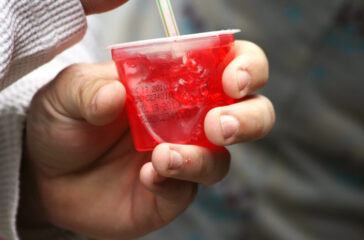Clothing dye raises diabetes risk in pregnant women
By Brian Bienkowski
Pregnant women exposed to a harmful clothing dye have a higher risk for gestational diabetes when they are carrying a male fetus, according to a new study.

By Brian Bienkowski
Pregnant women exposed to a harmful clothing dye have a higher risk for gestational diabetes when they are carrying a male fetus, according to a new study.

By Brian Bienkowski
Nearly 20% of packaged foods and drinks in the US have synthetic dyes, with most marketed to children and loaded with sugar, according to a new study that examined nearly 40,000 items from popular food brands.

By Brian Bienkowski
Kraft Heinz, the food giant behind dozens of popular brands including Oscar Mayer, Jell-O, Velveeta and Kool-Aid, will not launch any new foods with synthetic dyes and will remove the dyes from its current products by the end of 2027, the company said Tuesday.

By Brian Bienkowski
Breathing in these tiny particles — largely caused by traffic, industry, burning fossil fuels and wildfire smoke — disrupts the molecules in pregnant women’s blood, raising the risk for preterm and early births, according to a new study from Emory University.

By Brian Bienkowski
As synthetic food dyes increasingly come under public and federal scrutiny over health concerns — in part bolstered by the Make America Healthy Again, or MAHA, movement — slightly altered flavors in some of Americans’ favorite snacks are just one of the concerns and challenges with switching to dyes made from natural sources.

By Brian Bienkowski
Federal health officials announced plans Tuesday to phase out synthetic food dyes made from petroleum, marking a significant shift in how the U.S. regulates chemical additives in food.

By Shannon Kelleher
While monsters under the bed may be just childhood fantasy, parents might have real reason to fear what’s lurking in their children’s mattresses.

By Douglas Main
Companies making fluoride-containing toothpastes and mouthrinses are improperly marketing their products as harmless and pleasant-tasting to very young children despite scientific research showing ingestion of the products could be dangerous to their health, according to allegations in a group of proposed class action lawsuits filed earlier this month.

By Carey Gillam
US regulators on Wednesday said a food additive long linked to cancer will no longer be allowed in food and drugs that are ingested, a regulatory decision health advocates have demanded for years.

By Shannon Kelleher
In the waning days of the Biden administration, a long-fought battle over a cancer-causing food additive is again in the spotlight as consumer advocacy groups and lawmakers demand federal regulators ban Red Dye No. 3, a chemical used to give popular candies, foods and drinks their cherry-red colors.